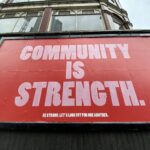I find myself appalled at the latest mass shooting in Lewiston, Maine. The horror of so many people innocently gunned down in a bowling alley and restaurant sends terror to my heart. I couldn’t help but think on the way to the store last night that no one is safe any place.
I wrote a few months ago about the disconnect between the national outrage over these incidents, and our lack of will and ability to organize for any kind of change that might reduce the frequency of these violent murders.
While grim statistics don’t translate into change, they bear repeating. As of 10/23/23, according to the Gun Violence Archive, there have been 566 mass shootings in the United States and 35,383 deaths caused by guns so far this year in the United States. The media is reporting the Maine mass shooting on October 25 is the largest mass shooting incident of the year.
A recent Pew Research report found that in 2021, more Americans died from gun violence than any year on record. The most recent data shows 10.6 gun deaths per 100,000 people in the US compared to 2.1 or lower in Canada, France, Germany, and Australia.
While the deaths are appalling, the news coverage of this, and other tragedies, is outrageous and adds to our personal and national trauma. Media focused on drawing readers and viewers, and thus growing their profits, bring us hundreds of reporters and useless reporting from the scene. I can’t watch the TV coverage. It is so focused on dramatizing people’s personal tragedies and sensationalizing the manhunt while speculating on the mental health of the person responsible.
Do we really need to know all this? I don’t think so. Our addiction to negative news and the need to create heroes and villains render us unable to find positive solutions for these recurring tragedies.
In my August 1 post The Challenges of Speaking Out about Mass Shootings, I suggested anyone concerned about gun violence and shootings advocate that our elected officials in Washington DC immediately establish a commission, with all the various viewpoints represented, and charge it with completing a root cause analysis of why mass shootings continue and what actions are needed to end them.
There are obvious causes like easy access to guns, especially guns with rapid and mass destruction capacity. There is the challenge of providing support for people with mental health challenges in our country as well as destigmatizing mental illness and showing compassion for our many friends and neighbors who daily face mental health issues. There are for sure people working on both these fronts. How do we capture what they’ve learned and build a consensus for implementing their solutions?
Building consensus brings us to what may be the larger root cause – how does our national culture collude with this epidemic of violence? That, I suspect, is in some ways a harder exploration, and building any consensus around the answers is a bigger challenge. Our culture is an amalgam of our individual beliefs. And personal freedom is considered more sacred today for some than our common welfare and shared health and well-being.
Tensions between state rights and federal responsibilities and between individual rights and community welfare have stressed our democracy since our nation’s inception. Resolving these competing values is difficult. Like many apparent conundrums, progress comes from listening and exploring acceptable and effective solutions that move us beyond our polarized either/or thinking.
We each have choices about how we apply the serenity prayer of what we can change and what we can’t to our crisis of mass shootings and the resulting climate where no one feels safe. I encourage you to write to President Biden and other elected and community leaders to encourage them to support the work of deeper root cause analysis of this tragic reality and to fund and advance the changes needed to end it.




This post is the foundation for how we begin the process. Thank you for articulating a way forward in simple words and concepts. As a public health educator I know there is more that has to be done to educate our next generation of PH professionals. Thank you for giving me something to share with them.
Thanks Kim for your work in public health education and taking on these more complex and cahllenging issues. Tom
Amen! Thank you, Tom. Thank you for clear thinking on a complex topic and a good look at next steps…may we follow that path as a culture!
Thanks Shirin for being willing to look at the larger challenges with grace and wisdom. Tom